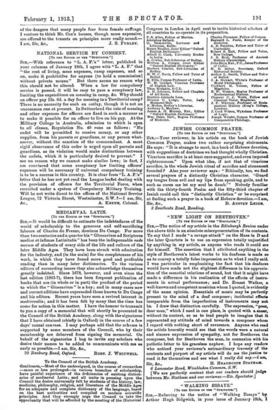MEDIAEVAL LATIN.
[To THE EDITOR OF THE "SPECTATOR.")
would be difficult to estimate the indebtedness of the world of scholarship to the generous and self-sacrificing labours of Charles du Fresno, dominus Du Cange. For more than two centuries and a quarter his " Glossarium ad Scriptores mediae et infimae Latinitatis " has been the indispensable vade mecum of students of every side of the life and culture of the later Middle Ages. They have been struck with admiration for the industry, and (in the main) for the completeness of his work, in which they have found more good and profitable reading than in many later dictionaries. To the various editors of succeeding issues they also acknowledge themselves greatly indebted. Since 1678, however, and even since the last edition (1883-7), there has been frequent publication of books that are (in whole or in part) the product of the period to which the " Glossarium " is a key; and in many cases new and correct editions have superseded those known to Du Cange and his editors. Recent years have seen a revived interest in mediaevalia; and it has been felt by many that the time has come for action in this matter. I have the honour to transmit to you a copy of a memorial that will shortly be presented to the Council of the British Academy, along with the signatures that I have obtained (chiefly in Oxford) in the course of a few days' casual canvass. I may perhaps add that the scheme is supported by some members of the Council, who by their membership are debarred from signing the memorial. On behalf of the signatories I beg to invite any scholars who desire their names to be added to communicate with me as early as possible.—I am, Sir, &c.,
To the Council of the British Academy.
Gentlemen,—Most of the undersigned, in the course of researches —more or less prolonged—in various branches of scholarship, have painful experience of the deficiencies of existing diction- aries of mediaeval Latin; and all unite in pressing upon the Council the desire universally felt by students of the history, law, medicine, philosophy, religion, and literature of the Middle Ages for an adequate and complete dictionary of the language, based on the best authorities and compiled on modern scientific principles. And they strongly urge the Council to take the opportunity that will be afforded by the meeting of the Historical Congress in London in April n all countries to co-operate in its
eat to invite historical scholars of preparation.
P. S. Allen, Fellow of Merton. Adolphus Ballard.
G. Baskerville, Lecturer and Librarian, Keble.
Henry Bradley, Joint Editor " Oxford English Dictionary."
Albert C. Clark, University Reader in Latin. in.
A. Cowley, Sub.Librarian of Bodley. William A. Craigie, Joint Editor
"Oxford English Dictionary." Herbert erester, Sub-Librarian of
Bodley.
H. W. C. Davis, Fellow and Tutor of Ball iol.
R. Ellis, Corpus Professor of Latin. W. M. Gelder% Vinerian Professor of English Law.
Thos. Hodgkin, D.C.L.
A. IL Johnson, Fellow and Chaplain of All Souls.
Beatrice Adelaide Lees.
Eleanor C. Lodge, Tutor, Lady Margaret Hall.
F. Madan, Bodley's Librarian. Anthony L. Mayhew.
James A. H. Murray, Not., Editor
" Oxford English Dictionary." Wm. Ogler, Bart., Regius Professor of Medicine, Charles Plummer, Fellow of Corpus. Reginald L. Poole, Keeper of the Archives.
A. B. Poynton, Fellow and Tutor of University.
Robert S. Rait, Fellow and Tutor, New College. J. S. Reid, Professor of Ancient History (Cambridge).
John Rhys, Knt., P.C., Jesus Professor of Celtic.
H. E. Salter, Secretary, Oxford Historical Society.
Arthur L. Smith, Fellow and Tutor of Balliol.
J. A. Stewart, White's Professor of Moral Philosophy.
Cuthbert H. Turner, Fellow of Magdalen.
E. W. Watson, Begins Professor of Ecclesiastical History. Clement C. J. Webb, Fellow and Classical Tutor, Magdalen.
J. P. Whitney, Professor of Hods,- sia.stical History (King'', College. London).
J. Cook Wilson, Wykoham Professor of Logic. Joseph Wright, Corpus Professor of Comparative Philology.










































 Previous page
Previous page